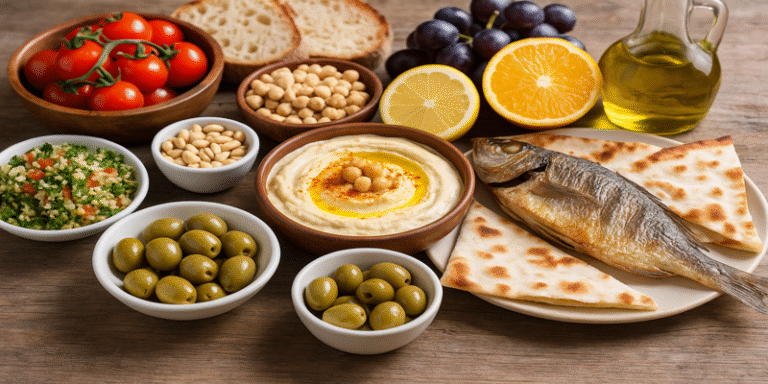The Mediterranean food culture is more than just a culinary tradition—it is a way of life deeply rooted in history, community, and respect for the natural environment. Characterised by an abundance of plant-based foods, olive oil, whole grains, fresh produce, and moderate consumption of fish and dairy, the Mediterranean diet has long been praised for its health benefits, environmental sustainability, and cultural significance (Hu et al., 2025; Alharbi et al., 2025). In recent decades, global research has confirmed what Mediterranean communities have known for centuries: that eating simply and seasonally can lead to longer, healthier lives and a more sustainable planet.
This article explores the nutritional composition, health benefits, and environmental and cultural value of Mediterranean foods, drawing on findings from contemporary journal research, academic textbooks, and reputable scientific sources.
1.0 The Origins of Mediterranean Food Culture
The Mediterranean region encompasses over 20 countries, each contributing to a shared but diverse food heritage. According to Vujačić et al. (2025), the Mediterranean diet (MedDiet) originated from the rural practices of southern Europe (particularly Greece, Italy, Spain and Turkey) and northern Africa (Morocco, Algeria, Tunisia, Libya, and Egypt), where people cultivated grains, legumes, olives, and vines, forming the basis of their daily sustenance. These foods were consumed in communal settings, reflecting a social and cultural emphasis on family, sharing, and moderation (UNESCO, 2010).
The Mediterranean food pyramid, conceptualised in the 1990s and updated by Hu et al. (2025), emphasises this cultural ethos by combining nutritional science with lifestyle factors, including physical activity, social eating, and mindful enjoyment of meals. These aspects together contribute to the holistic concept of Mediterranean living—a balance of body, mind, and environment.
2.0 Nutritional Composition and Key Ingredients
The hallmark of Mediterranean foods lies in their diversity and nutritional richness. According to Singh et al. (2025), the diet harmonises plant-based nutrition with sustainable consumption. Some defining ingredients include:
- Olive oil, known as “liquid gold”, is the primary source of fat, rich in monounsaturated fatty acids and antioxidants that promote heart health (Blundell et al., 2025).
- Legumes and grains, such as lentils, chickpeas, and barley, provide fibre and plant-based proteins.
- Fresh fruits and vegetables, particularly tomatoes, aubergines, and peppers, are loaded with vitamins, minerals, and phytonutrients that combat oxidative stress (Alharbi et al., 2025).
- Fish, particularly sardines and tuna, supply omega-3 fatty acids, crucial for cardiovascular and brain function (Faris et al., 2025).
- Moderate wine consumption, especially red wine, is linked to improved vascular function due to compounds like resveratrol.
The combination of these foods creates a nutrient-dense diet that supports both longevity and quality of life.
3.0 Health Benefits of the Mediterranean Diet
3.1 Cardiovascular and Metabolic Health
One of the most well-documented benefits of Mediterranean foods is their ability to protect against heart disease. A systematic review by Jones and Coe (2025) found that the Mediterranean diet significantly reduces LDL cholesterol levels, blood pressure, and inflammation, key factors in cardiovascular risk. Hu et al. (2025) further highlight that three decades of research consistently associate the diet with lower rates of obesity, type 2 diabetes, and metabolic syndrome.
3.2 Mental Health and Cognitive Function
Beyond physical health, the Mediterranean diet contributes to mental well-being. According to Faris et al. (2025), high adherence to this diet is linked with lower depression rates and improved cognitive function. The abundance of B vitamins, antioxidants, and healthy fats helps maintain neuronal integrity and reduce oxidative damage in the brain.
3.4 Cancer Prevention
Recent findings by Jones and Coe (2025) and Singh et al. (2025) suggest that the Mediterranean diet may play a role in reducing cancer risk through anti-inflammatory compounds and polyphenols found in olive oil, nuts, and vegetables. For example, the antioxidant lycopene in tomatoes is associated with lower prostate and breast cancer risks.
3.5 Gut Health and Immunity
The Mediterranean diet is also known to support gut microbiome diversity, which enhances immunity and digestion. Gänzle et al. (2025) demonstrate that fermented Mediterranean foods like yoghurt, sourdough bread, and olives introduce probiotic microorganisms that improve gut health and nutrient absorption.
4.0 Sustainability and the Mediterranean Model
4.1 Environmental Impact
In addition to health advantages, Mediterranean foods are models of environmental sustainability. The diet’s emphasis on local, seasonal, and plant-based ingredients minimises the carbon footprint and promotes biodiversity (Alharbi et al., 2025). The reliance on traditional agricultural practices, such as crop rotation and polyculture, ensures long-term soil health and water conservation (Rao, 2025).
4.2 Social and Economic Dimensions
The cultural value of Mediterranean eating extends to its role in community resilience and local economies. Vandecandelaere and Marie-Vivien (2025) note that many Mediterranean foods—such as Parmigiano-Reggiano cheese, extra virgin olive oil, and Cretan honey—carry geographical indications, protecting artisanal production and sustaining rural livelihoods.
Moreover, as Patti (2025) argues, the Mediterranean diet exemplifies how biodiversity and food heritage can coexist, preserving both human health and environmental balance.
5.0 Mediterranean Foods in Modern Life
In today’s fast-paced, globalised world, Mediterranean foods continue to inspire both chefs and health professionals. The popularity of dishes such as Greek salad, paella, hummus, and ratatouille reflects a growing global interest in healthy, natural, and flavourful eating.
Modern adaptations also incorporate sustainable innovation, including functional foods—such as olive oil-based snacks and phytonutrient-rich supplements—that blend tradition with scientific advancement (Blundell et al., 2025). These innovations align with consumer demand for clean-label, eco-friendly products that support well-being and environmental ethics.
Even within tourism, Vujačić et al. (2025) found that Mediterranean food knowledge among hospitality students in southern Europe fosters sustainable culinary tourism, promoting awareness of cultural identity and ecological responsibility.
6.0 Challenges to Mediterranean Food Preservation
While the Mediterranean diet has been globally celebrated, its adherence is declining in some Mediterranean countries due to urbanisation, fast food culture, and economic constraints (Hwalla et al., 2025). Younger generations are increasingly disconnected from traditional agricultural systems and cooking methods. Additionally, the commercialisation of “Mediterranean-style” foods sometimes leads to misinterpretations—such as overuse of olive oil or processed versions of traditional dishes—that deviate from authentic dietary principles.
Doğanay and Gündüz (2025) emphasise the importance of education and policy in promoting sustainable diets that remain culturally relevant and nutritionally balanced.
The story of Mediterranean foods is one of balance, beauty, and biodiversity. More than a diet, it represents a philosophy of living well—rooted in respect for the environment, mindful eating, and shared cultural heritage. Backed by decades of scientific research, it remains a gold standard of nutrition, reducing chronic disease risks while promoting mental and physical vitality.
In a world facing climate change, lifestyle diseases, and food insecurity, the Mediterranean food model offers a blueprint for sustainable and healthy living—a timeless reminder that the key to longevity and happiness may lie in the simplicity of fresh bread, olive oil, and good company.
References
Alharbi, F., Naumovski, N. & McFarlane, R.A. (2025) Traditional place-based diets and their effects on healthy and sustainable food transitions: a systematic literature review. Public Health Nutrition, Cambridge University Press.
Blundell, R., Ma, W. & Silva, A.S. (2025) Potential of phytonutrients: Innovations in functional foods, supplements, and active food packaging. University of Malta.
Doğanay, D. & Gündüz, K.B.E. (2025) Feeding Tomorrow: Sustainable Diets and Alternative Foods. Haliç Üniversitesi Sağlık Bilimleri Dergisi.
Faris, M.A.I.E., Benajiba, N. & Aboul-Enein, B.H. (2025) Adherence to the Mediterranean Diet Across the League of Arab States: A Systematic Review. Healthcare, 13(17).
Gänzle, M.G., Seifert, J., Weiss, J. & Zijlstra, R.T. (2025) Food Fermentation: an Essential Unit Operation Towards Secure, Sustainable, Safe, and Sustaining Food Systems. Frontiers in Science, 2(4).
Hu, F.B., Drescher, G., Trichopoulou, A. & Willett, W.C. (2025) Three Decades of the Mediterranean Diet Pyramid: A Narrative Review of Its History, Evolution, and Advances. The American Journal of Medicine, Elsevier.
Jones, B. & Coe, S. (2025) Exploring the Role of Diet in Reducing Cancer Risk in UK Firefighters: Mediterranean Pattern and Nutritional Strategies. Nutrition Research Reviews, Cambridge University Press.
Patti, M. (2025) Biodiversity Conservation and Sustainable Use of Ethnobotanical Cultural Heritage. University of Calabria.
Singh, N., Nehra, S. & Gaur, J. (2025) Traditional Herbal Food Practices and UN Sustainable Development Goals: A Meta-Analysis. Research Square.
Vujačić, V., Podovšovnik, E., Planinc, S. & Krešić, G. (2025) Bridging Knowledge and Adherence: A Cross-National Study of the Mediterranean Diet Among Tourism Students. Sustainability, 17(12).









